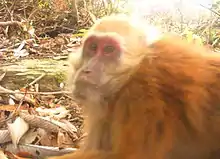Arunachal macaque
The Arunachal macaque (Macaca munzala) is a macaque native to Arunachal Pradesh in North-east India. It is listed as Endangered on the IUCN Red List.[1] It was scientifically described in 2005.[2]
| Arunachal macaque | |
|---|---|
 | |
| Arunachal macaque from Bugun and Shertukpen forests around Eaglenest WLS | |
| Scientific classification | |
| Kingdom: | Animalia |
| Phylum: | Chordata |
| Class: | Mammalia |
| Order: | Primates |
| Suborder: | Haplorhini |
| Infraorder: | Simiiformes |
| Family: | Cercopithecidae |
| Genus: | Macaca |
| Species: | M. munzala |
| Binomial name | |
| Macaca munzala Sinha et al., 2005[2] | |
 | |
| Arunachal macaque range | |
It is a relatively large brown primate with a comparatively short tail. Its species name comes from munzala ("monkey of the deep forest") as it was called by the Monpa people.[3]
Discovery

It was discovered as a new taxon in 1997 by the noted Indian primatologist Anwaruddin Choudhury, but he thought it to be a new subspecies of the Tibetan macaque (M. thibetana).[4] It was described as a new species in 2005 by a group of scientists from the Nature Conservation Foundation, India.[2] It is the first species of macaque to have been discovered since 1903, when the Indonesian Pagai Island macaque was discovered. This monkey was reported on the basis of a good quality photograph as the holotype. In 2011, some researchers suggested, on the basis of morphological variation within the Assamese macaque, that it might be better treated as a subspecies.[5]
Subsequently, it was also discovered in Bhutan, where it was observed and photographed in the Trashi Yangshi area in 2006.[6]
Description
The Arunachal macaque is compactly built and has a very dark face. It lives at high altitudes, between 2000 m and 3500 m above sea level, making it one of the highest-dwelling primates. It belongs to the M. sinica species-group of macaques, along with the Assamese macaque (M. assamensis), the Tibetan macaque, the bonnet macaque (M. radiata) and the toque macaque (M. sinica).
The Arunachal macaque is apparently physically similar to the Assam and Tibetan macaques, while genetically closely related to the bonnet macaque of southern India.[7] This is probably the result of convergent evolution, where organisms evolve similar physical features due to similar environmental selection pressure, while genetically they may have different origins. However, its full specific status is not beyond doubt and further research might show it to be a new subspecies of Assamese or Tibetan macaques.
This monkey is severely persecuted in some parts of its known distribution by locals retaliating against crop raiding. Recent surveys suggest that this species may be highly endangered in some parts of Arunachal Pradesh.
References
- Kumar, A.; Sinha, A. & Kumar, S. (2008). "Macaca munzala". IUCN Red List of Threatened Species. 2008: e.T136569A4311929.
- Sinha, A.; Datta, A.; Madhusudan, M. D. & Mishra, C. (2005). "Macaca munzala: a new species from western Arunachal Pradesh, northeastern India". International Journal of Primatology. 26 (4): 977–989. CiteSeerX 10.1.1.576.1210. doi:10.1007/s10764-005-5333-3.
- Press release issued jointly by NCF, WCS, New York, International Snow Leopard Trust & NIAS, Bangalore PDF Archived 30 December 2006 at the Wayback Machine
- Choudhury, A. (2004). "The mystery macaques of Arunachal Pradesh". Rhino Foundation Newsletter. 6: 21–25.
- Biswas, J.; Borah, D. K.; Das, A.; Das, J.; Bhattacharjee, P. C.; Mohnot, S. M. & Horwich, R. H. (2011). "The Enigmatic Arunachal Macaque: Its Biogeography, Biology and Taxonomy in Northeastern India". American Journal of Primatology. 73 (5): 458–73. doi:10.1002/ajp.20924. PMID 21246593.
- Choudhury A.U. (2008). "Primates of Bhutan and observations of hybrid langurs". Primate Conservation. 23: 65–73. doi:10.1896/052.023.0107.
- Chakraborty, D.; Ramakrishnan, U.; Panor, J.; Mishra, C.; Sinha, A. (2007). "Phylogenetic relationships and morphometric affinities of the Arunachal macaque Macaca munzala, a newly described primate from Arunachal Pradesh, northeastern India". Molecular Phylogenetics and Evolution. 44 (2): 838–49. doi:10.1016/j.ympev.2007.04.007. PMID 17548213.
External links
| Wikispecies has information related to Arunachal Macaque. |
